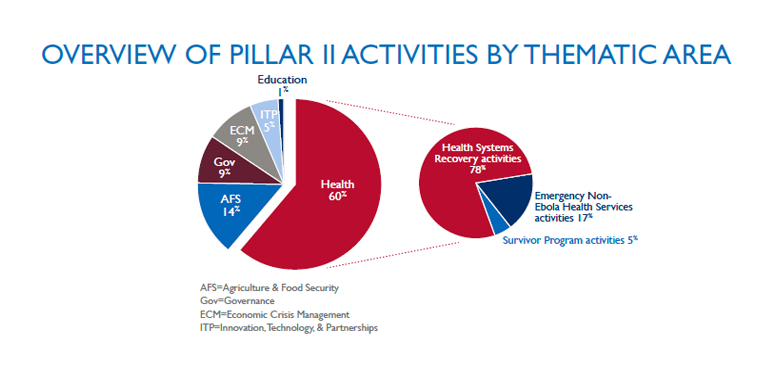Speeches Shim
Ebola: From Recovery to Self-Reliance
The United States was the world’s largest single-country donor to respond to the 2014-2015 West Africa outbreak, which severely affected three countries - Guinea, Liberia, and Sierra Leone. USAID led the whole-of-government international response effort to contain the disease and reduced the number of Ebola cases to zero. In total, over 28,600 people were infected and 11,300 died.
Build Back Better than Before
Beyond 2015 to 2018, USAID switched its focus to address longer term Pillar II recovery efforts in West Africa. The goal was to further mitigate the expected secondary effects of the Ebola epidemic, prevent loss of development gains and built sustainable systems to better withstand future shocks.
What is Pillar II?
USAID worked in partnership with host governments, international donors and partners in - Guinea, Liberia and Sierra Leone - to implement cross-cutting investments, a combined total of $2.4 billion dollars obligated by the United States Congress to assist West Africa Ebola recovery in health, education, agriculture and food security, governance and economies, and technology and innovation.

Our Impact
The End of Ebola in West Africa
September 30, 2019 marks the end of USAID Pillar II activities and investments. The success of our post-Ebola recovery programs across the three countries strengthened health systems, transformed food security and sparked economic growth, while behavior change through community engagement built capacity for future emergencies.
USAID also institutionalized the One Health platform and Global Health Security Agenda across sub-Saharan Africa to ensure Ebola-affected countries and other nations in the region are better prepared to address new and emerging diseases threats as well as sustain critical health services. Since 2018, Guinea, Liberia and Sierra Leone have transitioned to building self-reliance in partnership with the private sector. USAID will continue to support their journey to solve development challenges.
Lessons Learned
Resources
- Who We Are
- What We Do
- What We Do
- Agriculture and Food Security
- Democracy, Human Rights and Governance
- Economic Growth and Trade
- Education
- Environment and Global Climate Change
- Gender Equality and Women's Empowerment
- Global Health
- Humanitarian Assistance
- Transformation at USAID
- Water and Sanitation
- Working in Crises and Conflict
- U.S. Global Development Lab
- Where We Work
- Reports and Data
- News and Information
- Work With USAID

Comment
Make a general inquiry or suggest an improvement.